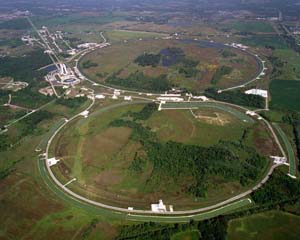Fermilab Discovery Potentially F'ing Around With Reality
By Karl Klockars in News on Apr 7, 2011 6:05PM
 Here's a lede you don't often get to write: "Dateline - Batavia, Illinois: The definition of 'reality' was challenged today..." Okay, so that might be over the top, but based on the news coming out of Fermilab recently, perhaps only by a little.
Here's a lede you don't often get to write: "Dateline - Batavia, Illinois: The definition of 'reality' was challenged today..." Okay, so that might be over the top, but based on the news coming out of Fermilab recently, perhaps only by a little.
Even though Fermilab's particle accelerator (known as the Tevatron) is scheduled for shutdown later this year, they're still producing science that has the potential to redefine modern physics and force further questions about exactly what makes up the things we call "atoms," "mass" and "the nature of everything we know as existence." Yesterday, scientists at Fermilab announced this:
Wednesday afternoon, the CDF collaboration announced that it has evidence of a peak in a specific sample of its data...The excess might be explained by the production of a new, unknown particle that is not predicted by the Standard Model, the current standard theory of the fundamental laws of physics.
Basically, a particle they didn't expect to see showed up and screwed with everything. Changing the Standard Model is a big freaking deal. If this isn't an anomaly, it forces physicists to go back to the drawing board and reassess everything they know about what makes up...well, everything. Not everyone is convinced yet, however, and the results will now move to the Large Hadron Collider in France for confirmation. As the New York Times reported on Tuesday,
The key phrase, everyone agrees, is “if it holds up.” The experimenters estimate that there is a less than a quarter of 1 percent chance their bump is a statistical fluctuation, making it what physicists call a three-sigma result, enough to attract attention but not enough to claim an actual discovery. Three-sigma bumps, as every physicist knows, can come and go.
In the announcement, Fermilab stated that the "significance of this excess was determined to be 3.2 sigma, after accounting for the effect of systematic uncertainties. This means that there is less than a 1 in 1375 chance that the effect is mimicked by a statistical fluctuation."
Translation: "We'll see."
If you speak fluent Physicist, the full paper is located here, and you can also view the lecture where it was discussed here. Oh, and why is Fermilab's particle accelerator scheduled to go dark at the end of the summer? Budgetary matters, of course.